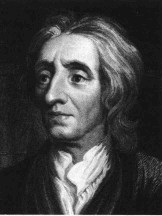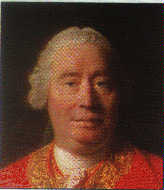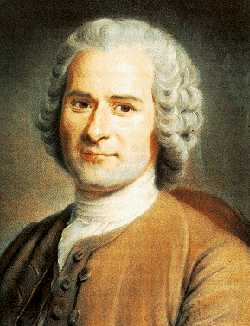Syllabus for PHIL 413.500: History of Modern Philosophy
Fall 2006; Dr. Stephen H. Daniel
Monday and Wednesday
History of Modern Philosophy examines the major themes and figures of the classical modern period (the 17th and 18th Centuries).
Textbook: The Longman Standard History of Modern Philosophy by Daniel Kolak and Garrett Thomson (Pearson Longman, 2006). Click on either amazon.com or half.com to order the book at prices as low as $21.50.
Recommended secondary source: A History of Philosophy by Frederick Copleston, vols. 4-6. These three volumes of Copleston's nine-volume History cover Descartes to Leibniz (vol. 4), Hobbes to Hume (vol. 5), and the French Enlightenment (e.g., Voltaire/Rousseau) to Kant. In early editions, volumes 5 and 6 each had two parts and were published as separate books, so if you buy individual volumes on-line, make sure you get complete volumes or both parts of each volume. In the late 1980s, the three volumes were bound together and sold as Book Two of Copleston's History. Book Two is no longer available from the publisher, but it is available on-line used (sometimes in very good shape). So if you want a good overview of 17th and 18th century philosophy, just get the three volumes in one book for as little as $7.00 at amazon.com or $7.35 at half.com. Get it at the same time you order your textbook to save on shipping costs.
- Pages listed below should be read before each class.
- While you are reading the selections, you should consider writing answers to the sets of questions provided as guides for each reading. Those questions are in lists that are linked below. At least 1/3 of your grade is based on answers to reading questions.
- You must turn in your answers at the beginning of the class in which the readings are discussed. You must also turn in at least three sets of answers prior to mid-semester.
|
Class meeting |
Topic |
Assigned Reading |
Reading Questions |
|
Aug. 28 |
Introduction: Copernicus, Newton, Bacon |
1-37, 180-203 |
|
|
Aug. 30 |
Descartes: Meditations I & II |
38-49 |
|
|
Sept. 4 |
Descartes: Meditations III & IV |
49-61 |
|
|
Sept. 6 |
Descartes: Meditations V & VI |
61-71, 99-101 |
|
|
Sept. 11 |
Descartes: Objections and Replies |
72-95 | |
|
Sept. 13 |
Hobbes: metaphysics/epistemology |
203-10, 221 |
|
|
Sept. 18 |
Hobbes & Locke: political phil |
210-220, 269-78 |
|
|
Sept. 20 |
Spinoza: God |
106-117 |
|
|
Sept. 25 |
Spinoza: mind-body |
117-30 |
|
|
Sept. 27 |
Spinoza: emotions/freedom |
130-44 |
|
|
Oct. 2 |
Leibniz: Letters, Truths |
144-54 |
|
|
Oct. 4 |
Leibniz: Discourse on Metaphysics |
155-68 |
|
|
Oct. 9 |
Leibniz: Monadology, Letters |
168-77 |
|
|
Oct. 11 |
Mid-semester exam |
|
|
|
Oct. 16 |
Locke: ideas |
222-36 |
|
|
Oct. 18 |
Locke: cause, substance |
236-55 |
|
|
Oct. 23 |
Locke: language, knowledge |
255-68 |
|
|
Oct. 25 |
Berkeley: abstract ideas, existence |
278-94 (sec. 21) |
|
|
Oct. 30 |
Berkeley: matter, spirit |
294 (sec. 22)-305 |
|
|
Nov. 1 |
Berkeley: nature |
305 (sec. 97)-320 |
|
|
Nov. 6 |
Hume: association of ideas |
321-35 |
|
|
Nov. 8 |
Hume: natural belief |
335-50 |
|
|
Nov. 13 |
Hume: liberty, self |
350-57, 361-71 |
|
|
Nov. 15 |
Voltaire & Rousseau |
373-88 |
|
|
Nov. 20 |
Kant: space, time, & categories |
389-417 |
|
|
(Nov. 22) |
Class cancelled (Thanksgiving travel) |
|
|
|
Nov. 27 |
Kant: Ideas of Reason |
417-40 |
|
|
Nov. 29 |
Kant: metaphysics |
440-63, 487-89 |
|
|
Dec. 8 (Friday) |
Final Exam |
|
|
*No reading questions are assigned for the first day of class.
Office:
Office hours: Monday & Wednesday
Phone: 845-5619 (office), 846-4649 (home)
Email: sdaniel@people.tamu.edu
Website: http://people.tamu.edu/~sdaniel/413sy06c.html
Grades/Tests
- The course grade is based on the total grades for the mid-semester and final (in-class essay) exams (each of which is worth 100 points), and the total number of points for answers to questions on the readings. These questions (which are listed at the links above) are each worth 1 point. There are 278 questions, so the more questions for which you receive full credit, the more you improve your overall course grade. To get an A for the course, you need a total of 267 points, a B 237 points, a C 207, a D 177.
- Some of the reading questions have several parts, so to receive full credit for a question, you must answer all parts correctly. (Note: these questions are not the questions listed as Study Questions in the book, nor are they the same questions students answered for this course last semester.) On some days, there are fewer questions than others. You must turn in your answers at the beginning of the class in which the readings are discussed. You must also turn in at least three sets of answers prior to mid-semester. For every set of answers you fail to turn in by then, you will lose 4 points.
- There is no grade for attendance, but if you miss classes, it affects how I grade your answers on tests. If you miss the mid-semester exam, you must arrange to take the make-up exam before the next class meeting (within four days).
University Policies
- Students with disabilities are guaranteed a learning environment that provides for reasonable accommodation of their needs. If you believe you have a disability requiring accommodation, please contact the Department of Student Life, Disability Services, Cain Hall B118, or call 845-1637.
- Students are bound by the Aggie honor code not to cheat. Submitting work from another source (e.g., a book, article, the Internet, or another student), using notes or copying from another student during a test, or modifying a previously graded test to improve one's grade are acts of scholastic dishonesty. Information on cheating and plagiarism can be found at http://www.tamu.edu/aggiehonor/acadmisconduct.htm.
![]()
![]() Send
Dr. Daniel a message: sdaniel@people.tamu.edu
Send
Dr. Daniel a message: sdaniel@people.tamu.edu
(If you are sending a message from a campus terminal, don't forget to
include your email address in the message so that he can reply to you.)
![]()








